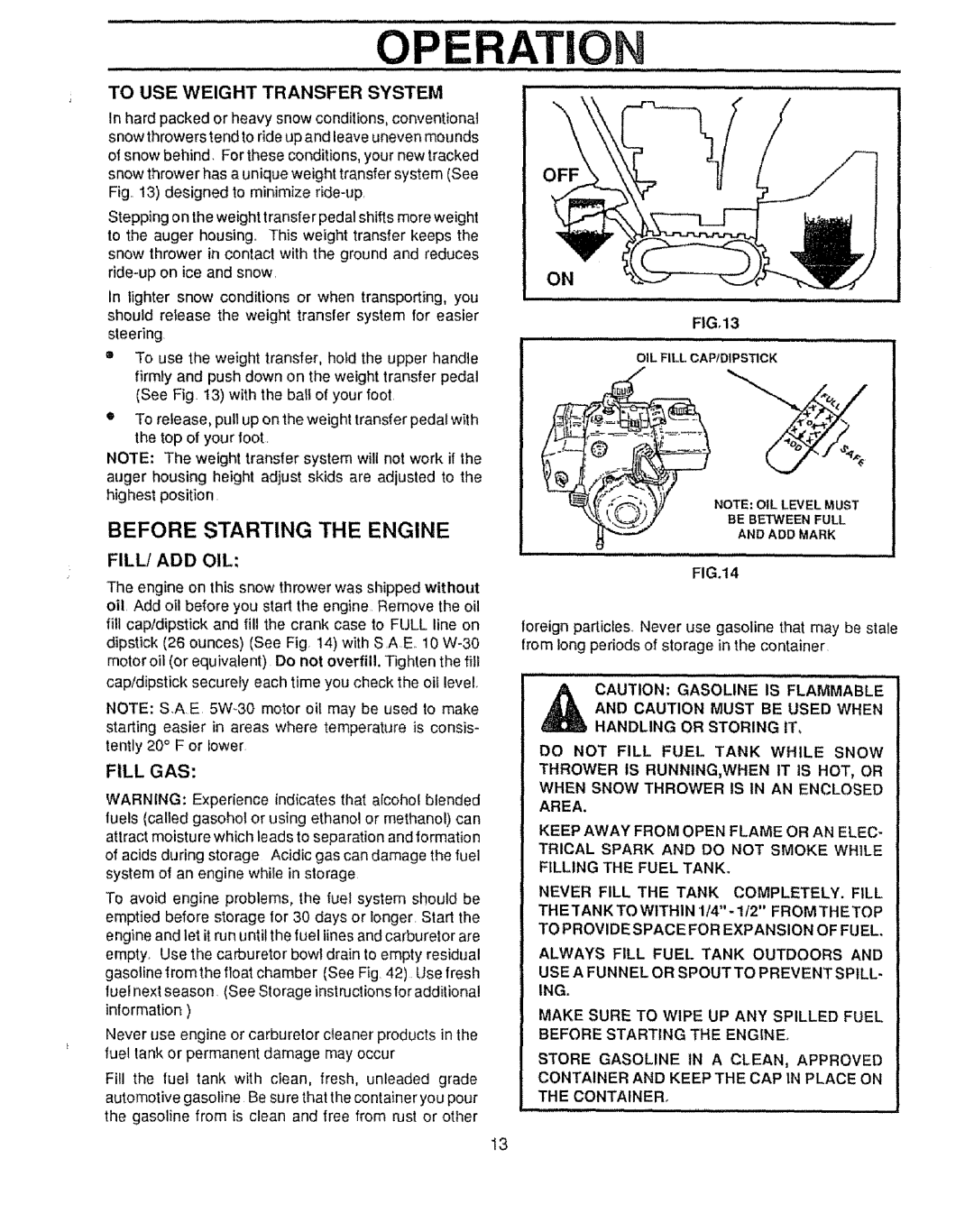
TO USE WEIGHT TRANSFER SYSTEM
In hard packed or heavy snow conditions, conventional snow throwers tend to ride up and leave uneven mounds of snow behind, For these conditions, your new tracked snow thrower has a unique weight transfer system (See Fig 13) designed to minimize
Stepping on the weight transfer pedal shifts more weight to the auger housing,, This weight transfer keeps the snow thrower in contact with the ground and reduces
In lighter snow conditions or when transporting, you should release the weight transfer system for easier steering,
•To use the weight transfer, hold the upper handle firmly and push down on the weight transfer pedal (See Fig I3) with the bali of your foot
•To release, pull up on the weight transfer pedal with the top of your foot,
NOTE: The weight transfer system will not work if the auger housing height adjust skids are adjusted to the highest position,
BEFORE STARTING THE ENGINE
FILL/ADD OIL:
The engine on this snow thrower was shipped without oil Add oil before you start the engine Remove the oil fill capfdipstick and till the crank case to FULL line on dipstick (26 ounces) (See Fig 14) with SAE 10
NOTE: S.A E
FILL GAS:
WARNING: Experience indicates that alcohot blended fuels (called gasohot or using ethanol or methanol) can attract moisture which leads to separation and formation of acids during storage Acidic gas can damage the fuel system of an engine while in storage
To avoid engine problems, the fuel system should be emptied before storage for 30 days or longer. Start the engine and let it run until the fuel lines and carburetor are empty, Use the carburetor bowl drain to empty residual gasolinefromthe float chamber (See Fig. 42)Use fresh fuel next season. (See Storage instructions for additional information )
Never use engine or carburetor cleaner products in the fuel tank or permanent damage may occur
Fill the fuel tank with clean, fresh, unleaded grade automotive gasoline Be sure that the container you pour the gasoline from is clean and free from rust or other
OFF
ON
FIG,13
OIL FILL CAPtDIPSTICK
NOTE: OIL LEVEL MUST
BE BETWEEN FULL
AND ADD MARK
FIG.14
foreign particles, Never use gasoline that may be stale from long periods of storage in the container,
, i,u,i | H | , |
CAUTION: GASOLINE IS FLAMMABLE AND CAUTION MUST BE USED WHEN HANDLING OR STORING IT,
DO NOT FILL FUEL TANK WHILE SNOW THROWER IS RUNNING,WHEN IT IS HOT, OR WHEN SNOW THROWER IS IN AN ENCLOSED
AREA.
KEEP AWAY FROM OPEN FLAME OR AN ELEC-
TRICAL SPARK AND DO NOT SMOKE WHILE FILLING THE FUEL TANK.
NEVER FILL THE TANK COMPLETELY. FILL TH E TAN K TO WITHIN 1/4"- 1/2" FROM THE TOP
TO PROVIDE SPACE FOR EXPANSION OF FUEL,
ALWAYS FILL FUEL. TANK OUTDOORS AND USE A FUNNEL OR SPOUT TO PREVENT SPILL- INGo
MAKE SURE TO WIPE UP ANY SPILLED FUEL BEFORE STARTING THE ENGINE,
STORE GASOLINE IN A CLEAN, APPROVED CONTAINER AND KEEP THE CAP IN PLACE ON THE CONTAINER,
.... | ,H | , |
13
